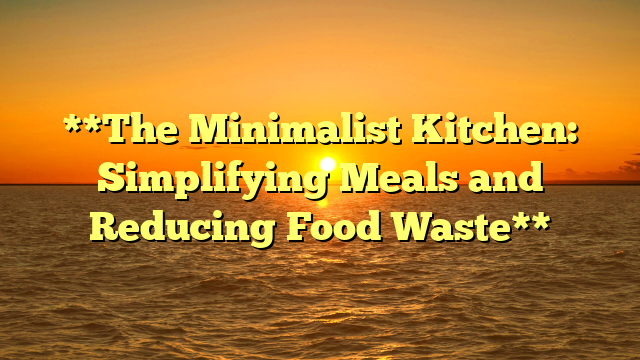
In today’s busy world, kitchens can often become cluttered with an overwhelming amount of gadgets, utensils, and food that we rarely use. The minimalist approach to the kitchen focuses on simplicity, practicality, and sustainability. By simplifying meal preparation, reducing excess ingredients, and minimizing unnecessary kitchen tools, the minimalist kitchen helps reduce food waste while encouraging healthier, more mindful eating habits.
**The Principles of a Minimalist Kitchen**
A minimalist kitchen isn’t about having a stark, empty space—it’s about creating a functional, efficient environment where everything has a purpose. The goal is to streamline the kitchen to make cooking easier, reduce waste, and encourage conscious meal planning. By focusing on quality over quantity, a minimalist kitchen reduces the clutter of unnecessary items and promotes a more mindful approach to both cooking and food consumption.
**1. Declutter Your Kitchen Space**
A key component of minimalism is decluttering, and the kitchen is no exception. Start by removing items that you don’t use regularly. Many kitchens contain tools or appliances that have not been used in months—if not years—such as specialized gadgets or duplicate items.
Consider these steps to simplify your kitchen:
– **Keep only essential tools** – Focus on versatile items that serve multiple purposes, such as a chef’s knife, a cutting board, and a reliable pot.
– ** samosir88 ** – Store only the items you use daily, creating a clean and organized space that’s easier to work in.
– **Minimize storage clutter** – Organize your cabinets, drawers, and pantry, discarding items that are expired, damaged, or unlikely to be used.
**2. Simplify Meal Preparation**
A minimalist kitchen also means simplifying how you approach cooking. Rather than relying on complex recipes or ingredient lists, focus on easy, nutritious meals that require minimal preparation.
Consider these tips:
– **Plan meals ahead of time** – Make a weekly meal plan to avoid buying unnecessary ingredients and reduce food waste.
– **Embrace batch cooking** – Prepare large portions of meals that can be eaten throughout the week, such as soups, stews, or casseroles.
– **Cook with fewer ingredients** – Focus on fresh, whole foods that can be used in multiple dishes. For example, roasted vegetables can be used in salads, sandwiches, or as a side dish.
By streamlining your cooking routine, you’ll save time, reduce stress, and minimize the urge to rely on convenience foods.
**Reducing Food Waste in a Minimalist Kitchen**
Food waste is a major issue globally, and one of the simplest ways to reduce it is by adopting minimalist practices. A minimalist kitchen encourages you to buy only what you need, use leftovers creatively, and repurpose ingredients before they go bad.
Here’s how you can reduce food waste:
– **Shop with a purpose** – Create a shopping list based on your meal plan, and stick to it to avoid impulse purchases that may not get used.
– **Store food properly** – Proper storage ensures food stays fresh for longer, reducing the likelihood of spoilage.
– **Repurpose leftovers** – Transform leftovers into new meals, like turning last night’s roasted vegetables into a soup or a stir-fry.
– **Compost** – For food scraps that can’t be repurposed, consider composting to reduce landfill waste.
By being intentional about your food choices and utilizing everything you buy, you’ll save money, reduce your environmental impact, and reduce food waste.
**The Benefits of a Minimalist Kitchen**
A minimalist kitchen has several advantages, including:
– **Increased Efficiency** – A decluttered kitchen allows you to work more quickly and effectively.
– **Less Stress** – Simplifying your meal prep and reducing decision fatigue leads to a more enjoyable cooking experience.
– **Improved Health** – Focusing on whole, nutritious ingredients encourages healthier eating habits.
– **Reduced Environmental Impact** – By minimizing waste and buying only what you need, you contribute to a more sustainable lifestyle.
The minimalist kitchen is about more than just cleaning out your cupboards—it’s about creating a space where cooking is simpler, meals are healthier, and food waste is minimized. By embracing this approach, you can simplify your kitchen, reduce clutter, and make more mindful choices that benefit both you and the environment.





